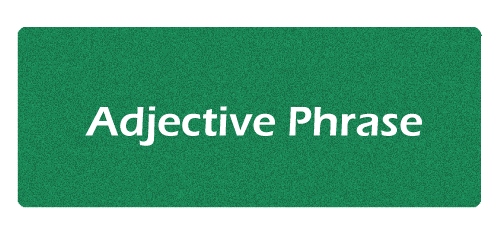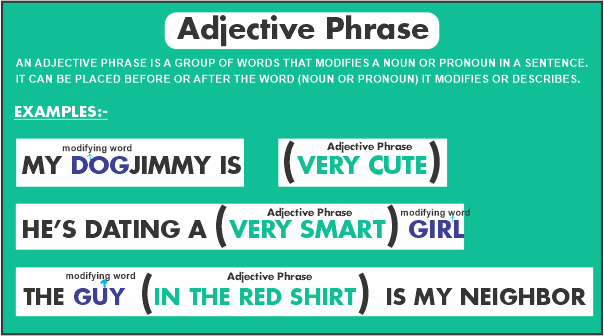Adjectival PhrasesAdjective phrases are some of the various kinds of phrases which individuals utilise in their daily speaking and writing. Adjectives are often utilized to define or describe the nouns. Also, Adjective phrases are utilized to define or describe the adjectives. Furthermore, the adjectival phrases enhance the sentences by giving more colorful descriptions for the nouns. 
The adjectival phrases are a blend of words in a sentence that define the nouns or pronouns. In an adjectival phrase, the adjective might appear at the starting, ending, or middle of the phrase. In the statement, the adjective phrase might come prior to or post the noun or pronoun. What Exactly Is an Adjectival Phrase?It's simple to mix up an adjective and an adjectival phrase. An adjectival phrase, also known as an adjective phrase, is a string of words whereby an adjective alters a noun or pronoun in a statement. A combination of words in a phrase that incorporates an adjective is known as an adjectival phrase. It functions as an adjective by defining a noun; For example, Winny is fluffier than most of the other dogs. What Does an Adjectival Phrase Comprise Of?The key to identifying an adjectival phrase is to look at the first word of the collection of words. If it is an adverb or the preposition, it's an adjectival phrase made up of an intensifier and an adjective. When one adjective is insufficient to describe a noun, a sequence of adjectives can be used to form an adjectival phrase. What Can an Adjectival Phrase Do in A Statement?Employing adjectival phrases can assist the students in improving their writing abilities since they will give their statements more personality and character. Sometimes all that is needed is a single word to make the statement shine; however, employing adjectival phrases will boost the amount of detail supplied and get them truly interested in their writings. 
What Is the Composition of An Adjective Phrase?Let us just break down the composition of an adjective phrase to fully understand it. So, phrases can be defined as the combo of words which is really not a complete statement but conveys a coherent thought. They are utilised to provide context and lucidity in the sentences. So here are some phrases to help you get going with the concept: Up the hill An adjective is a term that explains a noun. Adjectives include the following: Green The adjective phrases refer to the phrases which consist of an adjective; however, there is more to it; the adjective phrases are the phrase that function as the adjectives by characterizing the nouns. Explore the bolded adjectival phrases in the following sentences: They did not believe our team leader when he warned them about the extremely notorious creatures they had come across as they walked deeper into the forest. He was smaller than his colleagues. So, it is pretty evident from these examples, that the adjectival phrases may come prior or post the noun it is characterizing. How to Recognize Adjective PhrasesDetermine who or what the statement refers to. When looking for an adjective phrase in a statement, start with the noun. As an example, consider the following sentence: After searching around for weeks, I finally got a reliable yet budget-friendly and used SUV . This statement contains two nouns: the person speaking and the SUV. Next, search for adjectives, which are words that change nouns. Only one noun, the vehicle, is mentioned in our example statement: It's an old or used SUV But, if you look closely, you'll notice that it's more than just a used vehicle?a it's reliable, yet budget-friendly, used SUV. "Reliable, yet budget-friendly, used" is an adjectival phrase since it gives descriptive information and more information about the noun "SUV." We could remove this adjective phrase, and the statement's meaning would remain unchanged: After searching for weeks, I finally got a used SUV. However, by presenting the entire phrase, we are more thoroughly detailing the particular type of vehicle the speaker desired, providing context for why they looked around for such a long period. Search for phrases that might be removed from statements without altering their meaning but are kept since they give important background. Here are a couple more bolded adjective phrases that fit the criteria :
An adjective phrase is intended to contain numerous words. As the instances above show, more than one of them can be descriptors. When searching for an adjective phrase in a statement, seek for words that adhere to the Royal Order of Adjectives, which is the regular order in which English adjectives appear in phrases. Although you may not consciously consider the order in which adjectives must appear in a sentence, you will realize when they are out of order since the sentence will seem incorrect. What Is the Difference Between the Adjectival Phrases and The Adjective Clauses?A phrase is a string of words that cannot function as a sentence on its own because they lack the subject and the predicate. On the contrary the clauses often contain the subject(s) and the predicate(s). Also in certain instances, it can serve as the statement on its own.
Below are some instances of adjective clauses within sentences:
Below are some of the similar sentences with adjectival phrases substituted for the adjectival clauses:
Mistakes To Avoid in Adjective PhrasesAdjective phrases are quite effective with native English speakers. Adjective phrases are rarely misused. However, there is one noteworthy concern.
In reality, adverbs like "well," "quick," and "best" rarely have any genuine ambiguity, but the hyphen has become a matter of style, which is somewhat justified by the it-eliminates-ambiguity arguments. The similar thing can-not be said for "better" and "more." There is frequently ambiguity. Consider the following examples:
Adjective Phrase InstancesAdjective phrases exist in a variety of forms. Some include comparative and superlative adjectives, as in the following examples:
Compound adjectives are also frequently used in adjective phrases :
Adverbs can appear in adjective phrases :
They can also include prepositions :
An adjective phrase is often just a string of adjectives :
Whatever an adjective phrase comprises or where it comes in a sentence, it always makes the statement more detailed without changing the basic meaning of the sentence.
Next TopicTypes of Phrases
|
 For Videos Join Our Youtube Channel: Join Now
For Videos Join Our Youtube Channel: Join Now
Feedback
- Send your Feedback to [email protected]
Help Others, Please Share










